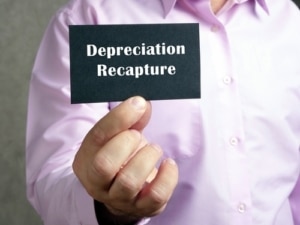Depreciation Recapture: Plan and Prepare
 One of our watchwords around the office is “have a plan.” The thing is, there are so many items that live in the world of business transactions that a business owner could be forgiven for saying, “What the heck is that?” when we tell them about something. One of those items (that gets that reaction) is depreciation recapture.
One of our watchwords around the office is “have a plan.” The thing is, there are so many items that live in the world of business transactions that a business owner could be forgiven for saying, “What the heck is that?” when we tell them about something. One of those items (that gets that reaction) is depreciation recapture.
Definition
If you have a sinking feeling as you’re considering the self-explanatory term, you’re not alone. But bear with us as we spell it out: depreciation recapture is the monetary gain from the sale of an asset at the ordinary income tax rate.
This could be less than you think, because, after all, we are usually talking about a used asset here. But in other circumstances, as with collectibles or real estate, we’re often talking about appreciation, and all that profitable gain beyond what was written off in depreciation is taxed at the capital gains rate.
Depreciation
To clarify for those who aren’t entirely clear on depreciation, it’s the wear and tear and operating expenses of a capital asset necessary for your business. It can be something as simple as a printer or as complex as a CNC machine.
There isn’t one way to calculate depreciation, though the one most are familiar with is the no-mystery-there “straight-line depreciation,” in which you take the difference between the original cost of the item and the value at the end of its usable life and divide that by the number of years the item will be in service.
An alternative to this is declining balance depreciation, which uses much larger amounts of depreciation early on in the item’s usable life. This is often used for tech purchases which can sometimes be capital-intensive.
Why
We don’t make the rules, but if you follow the logic, it’s a way for the IRS to recoup a portion of taxable revenue it didn’t receive because of a depreciation declaration against gross revenues.
Is It Avoidable?
Yes, but only for real estate, and only using the well-known 1031 exchange.
“But what if I don’t use depreciation?” We love that line of thinking, but someone must have tried that already because the tax code says that this applies to the depreciation that “was allowed or allowable.” So even if you don’t take it you’re going to be treated as if you did.
How Will This Affect My Transaction?
One of the first lessons new workers learn in the job market is that the amount of their salary isn’t what they get to keep. Business owners can be the exact same way when they talk about valuations and what they want out of a sale. The government is always going to get its take as well. And there’s even more at stake in regards to how all this is calculated, using terms like cost basis and adjusted cost basis and inputs like gross annual income of the business itself. That’s where the accounting part of your dream team comes in to help you calculate what your tax burden will be in relation to these assets and what kind of bite that takes out of your expected take-home from the sale.
Don’t feel bad if you didn’t know about depreciation recapture! There’s all sorts of stuff you might not know about business transactions. That’s where we can help. Give us a call.


